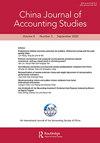Political connections and informal financing: use of trade credit in China
Q4 Business, Management and Accounting
引用次数: 0
Abstract
ABSTRACT Using a dataset of listed non-state-owned enterprises in China, we show that politically connected firms have a greater difficulty in obtaining trade credit than non-connected firms. This credit discrimination against politically connected firms strengthens when firms locate in regions with lower-quality legal systems or suppliers have greater bargaining power. Further analysis suggests that the lower credit reputation of politically connected firms stems from suppliers’ concern about contract enforceability, that is, politically connected firms receive regulatory favours from government, which can create obstacles to the collection of trade credit through the legal system. Our study contributes to the existing literature by investigating the impact of political connections on informal financing activities, and by revealing the asymmetric influence of political connections on formal and non-formal financing channels.政治联系与非正规融资:中国贸易信贷的使用
摘要利用中国非国有上市企业的数据集,我们发现政治关联企业比非关联企业更难获得贸易信贷。当公司位于法律体系质量较低的地区或供应商拥有更大的议价能力时,这种对有政治关系的公司的信贷歧视就会加剧。进一步的分析表明,政治关联企业的信用声誉较低源于供应商对合同可执行性的担忧,即政治关联企业从政府那里获得监管优惠,这可能会给通过法律体系收集贸易信贷造成障碍。我们的研究通过调查政治关系对非正规融资活动的影响,以及揭示政治关系对正规和非正规融资渠道的不对称影响,为现有文献做出了贡献。
本文章由计算机程序翻译,如有差异,请以英文原文为准。
求助全文
约1分钟内获得全文
求助全文
来源期刊

China Journal of Accounting Studies
Business, Management and Accounting-Business, Management and Accounting (all)
CiteScore
0.70
自引率
0.00%
发文量
19
审稿时长
6 weeks
 求助内容:
求助内容: 应助结果提醒方式:
应助结果提醒方式:


